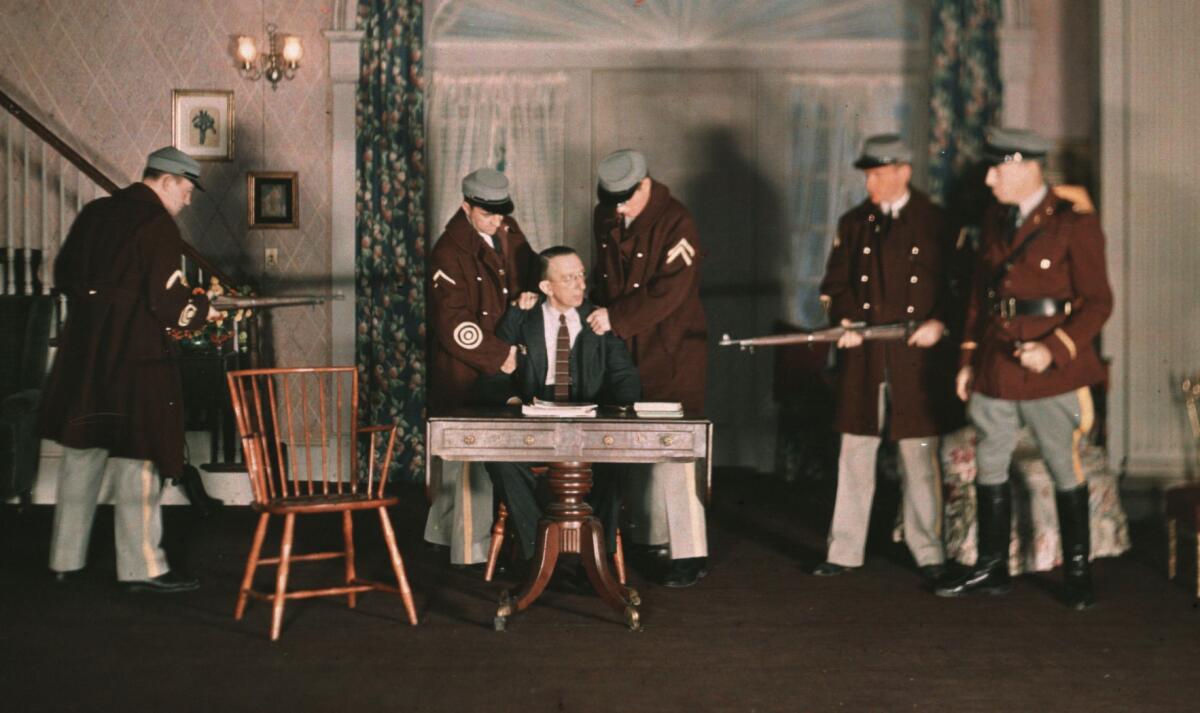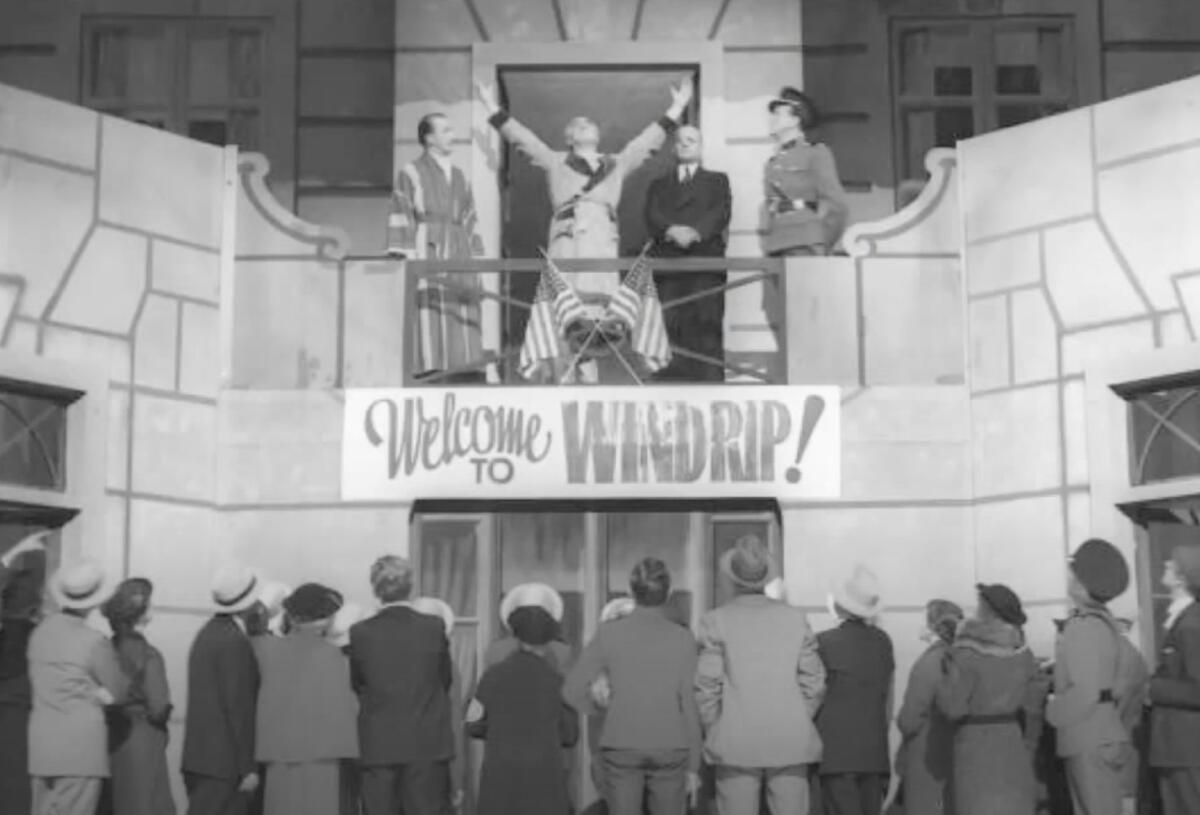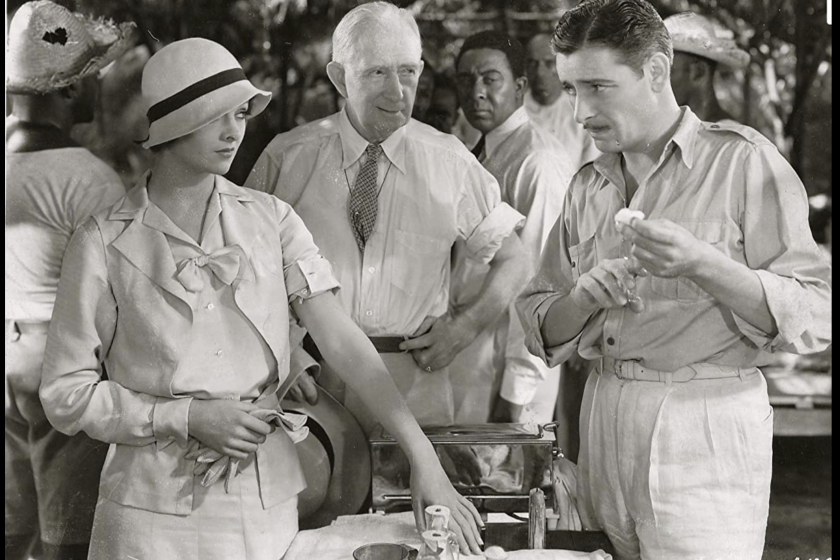Column: Sinclair Lewis’ fiery 1935 novel about a fascist coup is disturbingly prophetic

- Share via
Many notable works of literature have a strong strain of prophecy about them. Few American classics illustrate that as well as Sinclair Lewis’ 1935 bestseller, “It Can’t Happen Here.”
In writing this chronicle of a fascist coup in the United States, Lewis was disturbingly prescient about what it would take to jeopardize more than 100 years of democratic tradition in America. He foresaw not only that the threat would come from the right, but that it would come clothed in populist rhetoric and promises destined to be broken.
“It Can’t Happen Here” is notable not only for the vividness of its plot and characterizations, but for its role in perhaps the most audacious government-sponsored artistic events in U.S. history. This was the premiere of a play based on the novel as a nationwide event, opening simultaneously in 21 theaters in 17 states on the night of Oct. 27, 1936.
Not so worse to have a real Strong Man, like Hitler or Mussolini ... and have ’em really run the country and make it efficient and prosperous again.
— A character praises dictator Buzz Windrip in ‘It Can’t Happen Here’
The producer was the U.S. government, in the guise of the Federal Theatre Project, one of several New Deal relief programs aimed at keeping artists employed through the depths of the Great Depression.
In her 1940 memoir “Arena,” the Federal Theatre’s director, Hallie Flanagan, recounted: “In an amazing variety of methods, in English, Yiddish, and Spanish, in cities, towns, and villages, before audiences of every conceivable type ‘It Can’t Happen Here’ played, under Federal Theatre, 260 weeks, or the equivalent of five years.”
I last wrote about “It Can’t Happen Here” in October 2016 on the 80th anniversary of that theatrical event, taking the account from my book “The New Deal: A Modern History.” The contemporary context was the presidential campaign of Donald Trump, who unexpectedly prevailed in the election.
Get the latest from Michael Hiltzik
Commentary on economics and more from a Pulitzer Prize winner.
You may occasionally receive promotional content from the Los Angeles Times.
More recent events sent me back to the novel itself, and to a new respect for Lewis’ percipience about Americans’ vulnerability to the blandishments of political charlatans, and about his oracular vision of how a fascist takeover would unfold.
What’s most striking about Lewis’ work is how its details anticipate the recent trajectory of American politics.
“It Can’t Happen Here” isn’t Lewis’ only triumph of social or political clairvoyance. As I wrote last year, his 1925 “Arrowsmith,” about a heroic doctor battling the forces of scientific ignorance to prevent a series of epidemics, foretold the challenges of battling the COVID-19 pandemic in an America in which scientific achievements such as the vaccine are denigrated for political gain. (“Arrowsmith” was one of the five novels cited by the committee that made him the first American to win the Nobel Prize in literature in 1930.)
“It Can’t Happen Here” is largely told through the eyes of Doremus Jessup, a 60-year-old Vermont newspaper owner. With mounting alarm, Jessup witnesses the rise of Berzelius “Buzz” Windrip, a senator from an unnamed state with a theatrical flair and a platform promising the working class wealth confiscated from the affluent.
Windrip defeats Franklin Roosevelt for the 1936 Democratic presidential nomination and then defeats his colorless Republican opponent. From the inception, his campaign is acrid with antisemitism, racism, misogyny and contempt for science.
While the tenor of the presidential campaign has not a few Americans pondering the fascist threads in our recent political history, infused as it is with xenophobia, chauvinism and disdain for dissent, word arrives of a successful stage adaptation of Sinclair Lewis’ prescient 1935 anti-fascist novel “It Can’t Happen Here.”
His acolytes rail against “the Jew Communists and Jew financiers plotting together to control the country.” The “Fifteen Points” of his campaign platform call for the guarantee of “absolute freedom of religious worship” except to atheists, agnostics or “any Jew who shall refuse to swear allegiance to the New Testament.”
Point 10 dictates the prohibition of “all Negroes ... from voting, holding public office, practicing law, medicine, or teaching any class above the grade of grammar school” and forbids them to earn more than $10,000 a year. Only those Black workers who have been engaged in domestic service or farm or factory labor will be eligible for a government pension.
Women “shall, as rapidly as possible,” be directed to “return to their incomparably sacred duties as home-makers and as mothers of strong, honorable Citizens.”
Windrip declares himself “100 per cent for Labor, but 100 per cent against all strikes.” Once elected, he outlaws all labor unions, along with all political parties but his own American Corporate State and Patriot Party. He reduces Congress to only an advisory body, closes all private universities and converts public universities into glorified trade schools, and creates a private force of shock troops called the Minute Men. Is this where Florida Gov. Ron DeSantis got the idea to create a state militia that he, not the federal government, would control? Although California, like some other states, has a volunteer guard force, it’s part of the state’s National Guard and deployed chiefly for disaster assistance.
The America in which Windrip thrives is one that has casually accepted not only antisemitism and racism, but “Tammany grafting and Chicago gangs and the crookedness of so many of President Harding’s appointees,” Jessup reflects.
He ponders how followers of “William Jennings Bryan, who learned his biology from his pious old grandma, set up shop as scientific experts and made the whole world laugh itself sick by forbidding the teaching of evolution.”
That’s a reference to the 1925 Scopes “monkey trial” in Tennessee and a portent of the wholly unscientific opposition to the COVID-19 vaccines infecting our public discourse today.
Legislative debate is supplanted by violence that echoes Jan. 6: Jessup recalls that when Windrip was thwarted by the legislature in his home state, his militia occupied “the legislative chambers and all the state offices, and covering the streets leading to the Capitol with machine guns ... herded Buzz’s enemies out of town.”
The figure reigning over all this is a familiar type in American politics, made much more familiar in recent years. Prior to launching his political career, Windrip works as salesman for a snake-oil company that steers customers away from doctors in favor of its bottles of colored water and tobacco juice.

Windrip is seen “ascending from the vulgar fraud of selling bogus medicine ... to the dignity of selling bogus economics.” He displays a mystifying “power of bewitching large audiences” despite being “vulgar, almost illiterate, a public liar easily detected, and in his ‘ideas’ almost idiotic,” Lewis writes, “his celebrated piety ... that of a traveling salesman for church furniture.”
Yet his authoritarian state exists with the connivance of Big Money—millionaires who may have considered him vulgar, are “persuaded ... that actually he was the world’s one hope of efficient international commerce.”
Many of Q’s story lines, including evil lizard aliens and a cabal of pedophiles, are pulled from films and television shows. Screenwriters are not happy.
Then there’s the complacent echo chamber that normalizes Windrip’s outrageous behavior, “radio announcers who soft-soaped speakers who were fools, and wares that were trash ... preachers who did not believe the decayed doctrines they dealt out ... merchants who peddled brass for gold.”
Windrip’s roster of enemies of the people is ever-expanding: “Congenital traitors and bellyachers as Jewish doctors, Jewish musicians, Negro journalists, socialistic college professors, young men who preferred reading or chemical research to manly service.” They’re beaten in the streets, dispossessed, herded into concentration camps, subjected to forced labor.
Lewis drew his alarmed, and alarming, inspiration from the would-be autocrats of his era. Father Charles Coughlin, whose increasingly febrile radio broadcasts, mixing antisemitism with strident opposition to the New Deal, drew an audience of tens of millions, became the model for the radio priest Bishop Prag in “It Can’t Happen Here.”
The obvious model for Windrip himself was Huey Long, the former Louisiana governor and U.S. senator who was poised to challenge FDR in 1936 with his “Every Man a King” populist platform, until he was cut down by an assassin’s bullet in 1935. Long’s assassination still resonated so painfully in his home state that Flanagan canceled the Federal Theatre’s planned New Orleans production of “It Can’t Happen Here.”
A century ago, Sinclair Lewis predicted how America would botch the coronavirus crisis.
“If Long had not been assassinated months after Lewis finished the novel,” literary scholar Andrew Corey Yerkes has observed, “we might be reading it now as prophecy rather than speculation.”
So, too, did Lewis foresee the complacency with which encroaching fascism would be accepted by Americans.
“Why are you so afraid of the word ‘Fascism,’ Doremus?” one of his friends asks early in the book. “Might not be so bad, with all the lazy bums we got panhandling relief nowadays, and living on my income tax and yours. Not so worse to have a real Strong Man, like Hitler or Mussolini ... and have ’em really run the country and make it efficient and prosperous again.”
Adds another, “it just can’t happen here in America.” To which another of Jessup’s friends mouths silently, “The hell it can’t.”
More to Read
Get the latest from Michael Hiltzik
Commentary on economics and more from a Pulitzer Prize winner.
You may occasionally receive promotional content from the Los Angeles Times.













